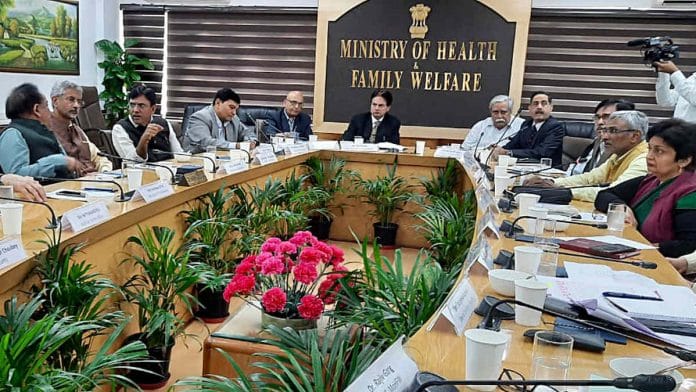New Delhi: The Narendra Modi government has sent out a to-do list to all central ministries and departments, recommending steps to mitigate the impact of the coronavirus outbreak in India.
The letter, signed by Cabinet Secretary Rajiv Gauba and addressed to secretaries of the ministries and departments, mentions specific tasks like identifying facilities and buildings that can be used as quarantine centres, developing a comprehensive media strategy to address rumours and myths, facilitating gram panchayat and panchayat samiti meetings to spread awareness, and facilitating surveillance activities especially in respect of international travellers.
Cabinet Secretary issues detailed guidelines for a concerted and whole of Government approach in order to prevent further imposition of Novel Coronavirus (COVID-19) cases & to build up a comprehensive & robust response system.
Specific tasks assigned to different Ministries.1/2 pic.twitter.com/U5AIrCeMu3
— Amitabh Kant (@amitabhk87) March 12, 2020
“As you may be aware, the Novel Coronavirus (COVID-19) cases have now been confirmed in more than 90 countries,” Gauba’s letter says.
“A public health situation of this scale requires a concerted and whole of government approach in order to prevent further importation of cases and to build up a comprehensive and robust response system.
“All central ministries/departments are required to step up their efforts and fully mobilise their resources to support the efforts of the M/o Health and Family Welfare in preparedness, control and containment measures,” it adds.
The letter says the ministries should “take expeditious action” and “mobilise all support in this regard”.
Also read: MEA set to brief foreign envoys on coronavirus, will allay concerns over travel advisory
Tasks assigned to different ministries
The home, defence, housing and urban development, tourism and minority affairs ministries have been tasked with identifying “facilities/buildings that can be used as quarantine centres or can be converted to temporary hospitals with isolation facilities”.
After the government decided Wednesday to temporarily suspended all visas for travelling to India (with a few exceptions) until 15 April, the Ministry of External Affairs has been asked to “monitor and take necessary action to ensure that unnecessary travel or trade restrictions are not imposed on India by other countries”.
The home ministry has been asked to provide regular and timely information (together with contact details) on international travellers arriving in India through the immigration bureau, ensure the continuity of essential services, conduct training workshops, mock-drills and awareness-generation exercises through the National Disaster Management Authority and the National Disaster Relief Fund, and maintain law and order and essential services.
The Immigration Bureau has been asked to ensure prompt and strict implementation of visa restrictions.
The MEA will have to convey situational updates from affected countries, provide information on travellers arriving from these countries, issue advisories to overseas Indians, and ensure that they are provided with appropriate medical treatment and other facilities. It has also been asked to monitor and advise on the impact of trade and travel restrictions for India.
The defence ministry has been asked to provide its support in the extension of the hospital and laboratories network by permitting use of facilities by civilians, and spare some of the experts and facilities from within the armed forces to contribute to the pool of public health experts.
Also read: Thank God coronavirus didn’t start in India, it lacks China’s grit: Ex-Goldman Sachs chief
Regulation of drugs
The pharmaceuticals department has been asked to “maintain situational awareness on supply and demand of essential Active Pharmaceutical Ingredient (API, which is the essential part of any drug and produces the intended effects), and act well in advance to avoid crisis situation”.
The department will also regulate drugs required for the COVID-19 pandemic, and address production of such drugs as recommended by the health ministry.
The Directorate General of Foreign Trade will have to monitor the export of such essential APIs/drugs/masks etc, and implement export restrictions on them to ensure adequate availability in India. The DGFT will also have to facilitate their import in consultation with the health ministry.
The Department of Science and Technology and the Indian Council of Medical Research have been asked to support research for diagnostics and vaccines, and support their adequate availability in India.
Also read: Tom Hanks and wife Rita test positive for coronavirus in Australia
Media strategy
The Ministry of Information and Broadcasting will have to develop a “comprehensive media strategy” to disseminate information about the virus and also contain the spread of rumours and myths, particularly on social media.
It has further been asked to roll out appropriate communication materials for national and state campaigns, and facilitate the availability of slots for media communication in print and visual media.
The tourism ministry will have to facilitate surveillance on travellers, adhere to the guidelines on environmental sanitation, disseminate public health messages at hotels, and maintain vigil at major tourist spots and towns across the country.
Also read: Funny videos, TikTok dances, serious info — how social media has responded to coronavirus






